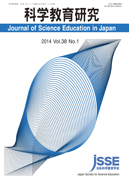巻号一覧

21 巻 (1997)
- 4 号 p. 197-
- 3 号 p. 135-
- 2 号 p. 73-
- 1 号 p. 1-
21 巻, 1 号
選択された号の論文の7件中1~7を表示しています
- |<
- <
- 1
- >
- >|
-
織田 揮準原稿種別: 巻頭言
1997 年 21 巻 1 号 p. 1-2
発行日: 1997/03/10
公開日: 2017/06/30
ジャーナル フリーPDF形式でダウンロード (240K) -
今堀 宏三原稿種別: 総説
1997 年 21 巻 1 号 p. 3-9
発行日: 1997/03/10
公開日: 2017/06/30
ジャーナル フリーOutlines of centenary history on science education in Japan of which effects contributed on culture modernization of Japan, was introduced first. Around 300 years' seclusion of this country made her culture far behind of many Europian countries. In order to make Japan more civilized country, the Japanese government invited many western bright scientists who taught science and technology mainly in Tokyo University. Wars happened in 1894-5 against China, and in 1904-5 against Russia. The Japanese army circles convinced these victories were led by superior weapons which were imported mainly from U. K. or Germany, and they convinced that promotion of science research and education is necessary to fix the national policy, 'A RICH COUNTRY WITH A STRONG ARMY'. The policy had been succeeded until around the end of the World War II . After the war, however, scientists and educators advocated that in order to be peaceful, nations should be endowed scientific attitude by innovated science education. Accordingly after the latter half century, PSSC, CBA, CHEMS AND BSCS of U. S. Projects were established and played important role in promotion of science education. Discussions on PSSC and BSCS are made, especially their influences to Japanese science education. Activities of the Japan Society of Science Education contributed the progress of science education during the past two decades. A COURSE OF STUDY has strong influence on teaching subjects for every level of school education in Japan. Class hour for science has been reduced during the past 35 years. Every scientists and technologists in Japan are now worry about degeneracy of innovative researches on science and technology in near future. One more problem is pointed out that Japanese course of study fails in plasticity of curricula. More discussions should be made in science classes, in order to make students more scientific-minded. National Science Education Standards of the United States which was proclaimed recently might show us some valuable suggestions in revising our COURSE OF STUDY. Finally some hints are given to promote the JAPAN SOCIETY OF SCIENCE EDUCATION.抄録全体を表示PDF形式でダウンロード (1000K) -
大木 道則原稿種別: 総説
1997 年 21 巻 1 号 p. 10-14
発行日: 1997/03/10
公開日: 2017/06/30
ジャーナル フリーThe objective of chemical education in the past was to nurture good successors in the field of chemical science and technology. However, another objective, to develop science literacy in the citizens, is added today. Following the movement of Modernization of Science Education, which was initiated in the United States in 1950's, working for improving chemical education in Japan, and discussing the science education problems worldwide, the author has become convinced that the unified system of education in Japan has to be reexamined, though the system has played an important role in enhancing the general level of appreciation of science in Japan as well as providing a number of good people who have engaged in science and technology. To this end, curricula which require thinking rather than memorizing facts are proposed. It may be necessary also to divide courses into two, one in which logical thinking is required and another which aims to nurture people who are supporters or sympathizers of science and technology. The latter course should include making decisions from available data. The importance of the idea, that chemistry is a discipline that enables people to handle dangerous materials safely, is pointed out by stressing the fact that there is nothing which is absolutely safe. Particular emphasis is placed upon curricula which suit individuals of various characters as well as training of teachers who can live with the new trend.抄録全体を表示PDF形式でダウンロード (658K) -
石川 聡子, 塩川 哲雄原稿種別: 実践論文
1997 年 21 巻 1 号 p. 15-22
発行日: 1997/03/10
公開日: 2017/06/30
ジャーナル フリーRecently STS education has been focused on the field of science education. We developed the "Batteries and Recycling" module, which was related to STS education and environmental education, and put this module into practice. We asked high school students to draw recycling diagrams using the KJ Method, both before and after learning about STS with regard to batteries. This concerned such questions as the use of batteries at home, disposal problems, construction materials, the energy consumed and given out, and so on, and the place of batteries in the history of science was also discussed. The students were able to assess their own views on the recycling of batteries. Before taking this module, the students had rather naive views about recycling : that people who practice recycling are good, and that recycling is very useful. They also imaged that the recycling process was very simple. However, after taking the module they realized that recycling was related to scientific technology and energy, and that it was also influenced by factors such as individual attitudes, costs, social organization, and so on. The students reached three conclusions about recycling : 1) recycling is a completely reliable system, 2) today's recycling system is, however, unreliable, 3) reducing waste is more effective than recycling.抄録全体を表示PDF形式でダウンロード (909K) -
原稿種別: 文献目録等
1997 年 21 巻 1 号 p. 23-43
発行日: 1997/03/10
公開日: 2017/06/30
ジャーナル フリーPDF形式でダウンロード (1630K) -
原稿種別: 文献目録等
1997 年 21 巻 1 号 p. 44-51
発行日: 1997/03/10
公開日: 2017/06/30
ジャーナル フリーPDF形式でダウンロード (371K) -
原稿種別: 文献目録等
1997 年 21 巻 1 号 p. 52-72
発行日: 1997/03/10
公開日: 2017/06/30
ジャーナル フリーPDF形式でダウンロード (1018K)
- |<
- <
- 1
- >
- >|